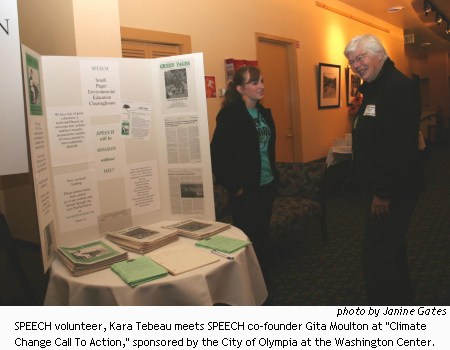The Teenagerís Guide to Environmental ActionBy Kara Tebeau I am a teenager.
I include myself among the youth of this planet who have inherited a climate crisis ó and I know it will become our responsibility to fix as we become adults and politically involved citizens of this nation. As I gaze into the future, I see famine, catastrophic loss of species, more flooding, more extreme weather, and a check from Social Security for zero dollars and zero cents. Well, that last part is unrelated to my main point, but you see where Iím headed. Weíve inherited a big mess that I sometimes feel will be impossible to clean up. The issue of global warming is difficult to address, and we know that the time to step up is now. But becoming part of the solution seems much more difficult for people my age. By this age, we have become more independent, have our own energy needs, places to go, and things to be purchased, but we donít have much control over many of these factors. We canít choose which kinds of cars our families buy. We canít ask for energy audits for our homes. We generally donít have a say in the purchase of appliances or groceries. We canít insist that our parents invest in environmentally friendly businesses. In short, we are not in direct control of our householdsí carbon impacts, and since we are not yet adults, we cannot vote for leaders and policies that are environmentally progressive. So what can we do? I suppose the first step is to inform ourselves about climate change, and to become passionate about it. Too often I read and hear the comments of people who remain ignorant about the subject. When their unsubstantiated argument that global warming isnít anthropogenic gets tired out, many revert to something along the lines of ďAl Gore is an idiot, and youíre an alarmist.Ē This ďclimateĒ of apathy must come to an end. So first things first: Be informed. But then what? What else can teenagers do? Environmentally progressive lifestyle changes can help us become part of the solution. Think about your impact. Susie buys clothes at Value Village, is a vegetarian, bikes, and drinks from a reusable water bottle. Jonathan leaves his computer on overnight, buys heavily packaged goods, and enjoys watching Susieís pained face as he drinks from a Styrofoam cup. Obviously, Susie has a smaller carbon footprint. An online footprint calculator, with adjustments made for personal footprint calculation (rather than household) can give you an idea of how much you contribute to global warming. The U.S. Environmental Protection Agency provides a personal carbon calculator at: www.epa.gov/climatechange/emissions/ind_calculator.html. The following suggestions include other ways for teens to lessen their impact:
|

